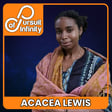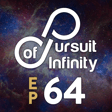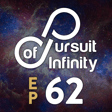Introduction to 'Pursuit of Infinity'
00:00:00
Speaker
Hello and welcome to Pursuit of Infinity, a podcast where we explore the depths of human consciousness and delve into the fascinating world of psychedelics.
Discussing Metaphysical Themes
00:00:09
Speaker
In this week's episode, Joe and I tackle a series of questions rooted in profound metaphysical themes, pushing us to express concepts that not only are tough to grasp, but challenge our ability of articulation as well. We discover points of agreement and disagreement, as well as areas where our thoughts intersect and enrich each other's understanding. Recording these episodes is among our favorites, and if you find them engaging as well, we invite you to explore our episode catalog where you'll find more like it.
Engagement and Support Channels
00:00:39
Speaker
But before we get to it, you can visit our website, PursuitOfInfinity.com, where you can not only listen to the podcast through our integrated media player, but find all the places you can follow us as well. If you enjoy the podcast, please consider a sub, a 5 star rating, or even a review. These things play a crucial role in extending the reach of our discussions as widely as possible.
00:01:01
Speaker
If you're an avid listener and you want to show us some extra support, you can become a patron at patreon.com slash pursuit of infinity. You'll get some great stuff in return. So head on over there for the details. Give us a follow on Instagram at pursuit of infinity pod and keep up with news and episode drops, memes, and general musings. Also below, you'll find links to our discord server and our YouTube channel, which is at youtube.com slash at pursuit of infinity.
00:01:28
Speaker
All of our episodes are always posted there in video format as well as an array of shorts that we have been putting together on a regular basis. Now with all that out of the way, thank you so much for listening and I hope you enjoy this week's episode.
Introducing Metaphysical Questions
00:01:55
Speaker
Hey everyone. Welcome to Pursuit of Infinity. I'm your host, Josh, and I'm joined by my co-host, Joe. And today we're going to go through a few metaphysical questions that we had found, similar to some of our earlier episodes where we went through philosophical questions. These are a bit more difficult, I feel like though. So I'm really interested to see where it takes us. So Joe, I don't know if you want to jump in and read the first question.
Is Anything Universally True?
00:02:23
Speaker
Yeah, let's do it. All right. The first question will be, is there anything that must be true of absolutely everything that exists? Oh man, that's a tough one. Is there anything that must be true of absolutely everything that exists?
00:02:42
Speaker
I don't necessarily think so unless you want to talk about what it means to be like to have absolute truth. I think the only thing that is absolutely true is that.
00:02:58
Speaker
Everything is one and I like to look at this in terms of whole lines as we talk about all the time on this show. The fact that everything in existence seems to be a whole made of parts which is made of a whole which make which is made of parts which make up another whole.
00:03:18
Speaker
So I think that the only thing that must be true about everything is that it has to be included as a part among the holes or let's say a part among other parts that make up the hole of whatever the one is. Okay. Yeah, I agree with that for sure.
00:03:40
Speaker
I think you'll probably agree with this too because I'll say this is probably like a fundamental thing. Is there anything that must be true of absolutely everything that exists? I would say, you know, experientially, everything that exists must exist within consciousness.
00:04:01
Speaker
I think everything that exists must be made of consciousness. So I think at the fundamental level, consciousness, the aspect of consciousness is the fundamental truth about everything in existence. So everything exists within consciousness, everything is made of consciousness, consciousness is all that is known. So every object, separate object that we perceive to be separate is of course included in the whole of consciousness, kind of like you were saying.
00:04:31
Speaker
Um, I think you could also say in a sense that everything, something that's true of everything that exists is this is a hard one. I was going to say subjectivity. What do you think of that? Do you think I feel like subjectivity is inherent to everything based on the perceiver.
00:05:00
Speaker
I think that you're correct when you're speaking of anything that exists experientially. So my question to you was going to be because you did start out by saying everything that exists experientially must exist within consciousness. So do you think that there can be something that exists outside of experience?
Is Subjectivity Inherent to Existence?
00:05:25
Speaker
Yeah, I think well first I would say consciousness
00:05:29
Speaker
Experience exists within consciousness. So consciousness is prior to experience, meaning that you could kind of say that consciousness exists outside of experience, or experience is not needed for consciousness to exist. So consciousness is prior to experience.
00:05:48
Speaker
And we kind of equate the two, I think. We think of consciousness being experience. But experience is a subjective thing that we have, whereas consciousness is the absolute whole, the unified truth.
00:06:07
Speaker
So yeah, I think it's important to think about it that way. Like experience comes after consciousness. It's a subjective form of consciousness kind of in a way. See, consciousness is like impossible to define because it's not a thing. And, you know, we talk in terms of things, but it is the absolute. It is, like I said, everything is made of consciousness. Everything is within consciousness. And you get there just by
00:06:35
Speaker
existing. You can see there's nothing that ever could exist outside of consciousness because the moment something it exists, you have to become aware of something for it to exist in the now. You know what I'm saying? So yeah. So do you think that awareness and consciousness are the same things or do you think awareness is sort of a word that comes into play when you're talking about the experiential nature of something? I think awareness is
00:07:05
Speaker
the best synonymous word with consciousness. Because consciousness seems when it comes up in discussions as kind of nebulous, even like I said, it's basically impossible to define it. You can describe it to try to invoke the meaning in somebody. But I would say awareness is the closest thing. And awareness is consciousness. It is being. Just simply being. And awareness is being.
00:07:35
Speaker
Yeah, it's tough because like you said, you can't define consciousness. It's not a thing, you know? It is that which contains all things.
00:07:47
Speaker
It's like a word that we use to describe the absolute. Right. And the absolute is just another word as well. But that's why I say instead of defining consciousness, the best thing you can do is I think kind of what we're doing here is try to invoke the meaning or invoke the
00:08:06
Speaker
the being of it in somebody because you can't, you know, give it to anyone with words. You can't put it down on a piece of paper and say, this is what it is. But you can use like metaphors and just I think metaphors are very helpful, but you can use words to try to invoke the meaning within somebody.
00:08:26
Speaker
so why don't we bring it back to because my answer and your answer to this question were kind of the same thing like we were basically saying like the only thing that must be true about everything that is that exists is that it's like part of the absolute part of the whole which is kind of like inherent it's almost common knowledge you would think
00:08:50
Speaker
So outside of that, or we'll say a level beneath that, do you think that there's anything that must be true of everything that exists? Like I said, everything is made of the same thing. So that's a little different. I kind of said that before. Everything is made of the same thing, which is consciousness.
Balance and Harmony in Existence
00:09:15
Speaker
I can't honestly, can you think of anything else?
00:09:20
Speaker
That's the only fundamental thing and then maybe subjectivity. Everything is subjective. Yeah, I don't think that there's anything that must be true about everything that exists aside from how we just put it.
00:09:40
Speaker
Everything I could say this also something that is must be true of everything that exists is that one is obviously everything that we see as existing as a perception. You could we could talk about like the elusive the elusive.
00:10:00
Speaker
illusory, is that the word? We could talk about the illusory nature of everything. Um, cause if we're talking about, you know, the absolute being one being whole, then that would mean everything that exists that we see, as you said, as a part of the whole is kind of an illusion of separation. So everything that exists other than the whole that appears as separate objects would be a part of the illusion of separation.
00:10:31
Speaker
Yes. And among the line, like along the lines of the illusion of separation, you could say that everything, and again, it's like almost the same thing that I said before about everything has to be a part of the whole. Like I think that everything has to be a balance. I think there are, there are a few things that everything is. Everything being a part of the whole is balanced. It's in harmony. Um.
00:11:00
Speaker
And it's, it has a function, everything must exist. Everything has a function and is part of an overall system that is perfect. And each part of existence has a role to play within the whole of existence.
00:11:21
Speaker
Yeah, I wasn't thinking of that, but I absolutely agree. I think that everything in existence has to be in absolute harmony. So that's why, especially in this state of consciousness, we perceive duality.
00:11:36
Speaker
Everything, I think, has a perfect duality, even in this illusory perception, not looking at the absolute, just the holy truth of God, basically. But it, like you said, it's a perfect harmony that balances to zero, basically. Everything is in perfect harmony that balances itself out perfectly.
00:12:01
Speaker
Yes. And harmony, I think, and balance work together. It's like the yin-yang. Everything must be balanced. The only reason that we have anything is because of the harmonious nature of balance. I totally agree. I don't know if you can think of anything else that must be absolutely true of everything that exists.
00:12:29
Speaker
I don't think I can think of anything else. You want to move on to the second one? Yeah, that's fine. All right. Number two, must anything that exists have intrinsic properties? So I think it's kind of along some of the same lines that I was just saying.
00:12:51
Speaker
It's intrinsic properties that they all are intrinsically made of consciousness. I don't want to just repeat the same thing because I think I'm going to answer exactly the same as everything we just said. I don't know if you have a different angle on this question, but I would say everything we just said are the intrinsic properties of everything that exists.
00:13:20
Speaker
Yeah, and I think the second part of the way that we were talking about balance and harmony I think is more along the lines of the intrinsic properties of things because like it seems like intrinsically things are just they have to be balanced and in harmony. So it almost seems like the second question is like an expansion of the first one. Yeah, I agree. And I think yeah, basically everything we just said
Are Properties Universal or Subjective?
00:13:46
Speaker
could apply to that.
00:13:47
Speaker
Um, you want me to read the next one? I'll read the next one just because we didn't really do much for the second one. I'll read the next one. Um, just so you have an opportunity to answer first. Uh, so number three is what are properties and are they universals or tropes or if not those what I would say properties.
00:14:17
Speaker
I wouldn't say they're universal. I think that if I'm getting this correctly, I would say that properties are all subjective relative perceptions or thoughts. I think, I mean, anything that I see a property in something, it doesn't necessarily have to be that way.
00:14:42
Speaker
From every perspective, I mean, even like, for instance, if you say the sky is blue, a property of the sky is the color blue, it's like, well, some species don't see blue, you know? I mean, so that's why I mean, like, relative certain properties might be specific to one state of consciousness versus another.
00:15:04
Speaker
Yeah, I totally agree. Um, properties seem to be synonymous with like adjectives or descriptions. Um, and those are based in the subjective realm, not the objective realm. So yeah, I totally agree with what you're saying. Uh, should I read the next one? Yeah, sure.
00:15:28
Speaker
Okay. Four, must anything that exists stand in some relation to something else? Oh, this is a cool one. That is a cool one. Yeah, I get what it's getting at.
00:15:46
Speaker
I don't like when they use the word anything, when they talk in such absolutes, but must anything that exists stand in some relation to something else? It's almost like the, um, like if you have empty space and you have one object, you don't really know what that object is unless you have another object to compare it to. And that goes for like distance and things like that. Um, so I would say anything that exists
00:16:15
Speaker
physically, for sure, must stand in some relation to something else. Now, if you want to talk about existence as the whole or like an absolute, then I don't think that experientially or outside of the physical, that things work in the same way.
00:16:42
Speaker
Um, as like a material thing, I think that there are realms outside of materialism that, uh, that don't follow the same types of rules that we consider to, you know, bound things within existence.
00:16:59
Speaker
So I would say, yes, anything that exists within the realm of the material. Absolutely. It has to exist in relation to something else, but with that word, anything in there, I think it sort of changes the answer to no, because I do think that there are things that exist outside of the realm of the physical.
00:17:20
Speaker
Yeah, I agree. I mean, the only thing, because like you said, anything, the only thing that doesn't have to exist in relation to itself is the totality and the infinite as one. So clearly, like the absolute, that's what you're getting at. And as far as objects in this state, in this realm that we're in, I think, yes, they have to stand in relation to something else.
00:17:46
Speaker
Because even without relativity, we lose kind of what you were saying, concepts such as scale. There would be no size to an object if it stands alone.
Relation of Physical to Consciousness
00:18:00
Speaker
So I think that there has to be some relation.
00:18:06
Speaker
that we perceive is, like, relativity is a huge thing. You know, that's why we live in a state of duality. Why, like, originally we just perceive dualities all around us. We speak in dualities. We couldn't speak. Language wouldn't exist if, you know, you can't relate something to its opposite or other. So I think that, yes, it has, something has to,
00:18:36
Speaker
relate to something else. I think relativism is pretty clear on that. And other than the absolute, then no. Yeah, I agree. I agree. All right. Did you read that one or did I? That was you. So I'll read number five, which is, must anything that exists be completely determinate or can there be vague objects?
00:19:06
Speaker
Vague objects. Hmm. What do you think that means, vague objects?
00:19:14
Speaker
I think vague and objects sort of cancel each other out because I don't know when I think of things that are vague like I approach this question by thinking of again like we always kind of approach these things as it's like material versus non-material or like physical versus non-physical that's where I think the vague objects come into play where it's like
00:19:39
Speaker
Or maybe you can even talk about like quantum physics in this sense, because it's like something can exist as a particle and a wave simultaneously, making it vague as opposed to determine it. Okay. Um, well, all right. Yeah, it makes sense. Uh, I would say then there can be vague objects because it says exists.
Can Objects be Vague in Different States?
00:20:07
Speaker
In existence, there are dreams. So in dreams, I would say there absolutely exists something that I would call vague objects. Things can change form. I mean, in a psychedelic trip, things change form. I don't know if you would say they become vague, but in a sense,
00:20:26
Speaker
things aren't 100% determinate. So in certain states, I would say, if I'm interpreting it right, that there can be vague objects, that your experience is so subjective that you, in certain states, you can literally change the objects that you're perceiving.
00:20:47
Speaker
If that makes sense. Yeah, I agree. Like, I think that the psychedelic state, the dream state are made of vague objects. They're the opposite of determinant. And as you said, they still exist.
00:21:03
Speaker
And you could even say, interestingly, I think reality is mind, so idealism. Now you see studies into psychic phenomenon, and depending on who you ask, that there are a lot of legitimate scientific studies that prove some of these things to be true.
00:21:28
Speaker
Like if someone holds up a flashcard and someone can predict at a high percentage what is on the other side. There's like objects on the card, psychic phenomenon like that.
00:21:40
Speaker
So that begs the question, like if reality is mind and psychic phenomena exists, there's a unique thing happening between the mind and what we perceive as objects, like what we call matter and what we call our finite minds. So…
00:22:02
Speaker
There might be some form of like quantum entanglement happening where you affect the object. You know what I mean? So something like that. I just lean towards there being as it calls vague objects. I don't think things are as determinate as, you know, maybe a materialist just views it. I think reality is a lot stranger and especially once you start altering your state.
00:22:30
Speaker
Yeah, this also reminds me of the question, does Santa Claus exist? So is Santa Claus determinate or is Santa Claus as the existence of an idea of vague object? So in that kind of circumstance, I would say 100%, you know, existence can include vague objects.
00:22:51
Speaker
That's true. Yeah. I like that. Definitely. Everything exists in that case, you know? And that I would say that's true. Yeah. Just exists as what it is. Doesn't have to manifest itself in any specific way for it to exist. I'm with you. Yeah. I like that. Is that me? Yeah, please. My memory is bad. Okay. Number six. Can there be things that exist that are not in time?
Existence Outside of Time
00:23:23
Speaker
Yeah, for sure. For sure. I mean, just rewind this podcast and listen to all the things that we had just talked about. And most of them are things that exist outside of time. Experience a lot of times can exist outside of time. You know, that would require
00:23:43
Speaker
If things could not exist outside of time, that would require time to be the fundamental like unit of reality. And as we discuss, I mean, ad nauseam on this podcast, space and time in our view are not fundamental necessarily. So, yeah. Yeah, they're, you know, relative at that and
00:24:09
Speaker
I'll take it a little further and even say that nothing exists in time. I'm sure there's gonna be questions about time in here, so I'm not gonna go crazy on that, but I would say that the only place anything can exist is in the eternal now. Everything else is about time. Everything that you think exists in another time just exists now in your thought.
00:24:38
Speaker
And that's just bringing everything directly to only your experience, erasing everything you know. If you have to base on what's true on only your experience, that's what I consider to be true. And what's true in my experience is in all the conscious,
00:24:57
Speaker
states I've ever had is that time isn't, you know, it's not what we believe it to be as like a fundamental thing that exists outside of thought. It's a convenient thing for this state. It's a part of the dream, I guess you could say.
00:25:16
Speaker
But everything that exists must exist now in whatever form, just like you said, Santa Claus. It exists as what it is right now. So anything that an elephant exists right now as what an elephant is, which is a thought in my head of an image of what that's how it exists. And it only exists as that right now.
00:25:37
Speaker
Yeah, I think that's the answer. The concept of now as opposed to time being an eternal line of successive events. Yeah.
00:25:48
Speaker
Mm-hmm. Eternity is all there is, you know? And that's something that you get, I think, from psychedelics. I think that would be hard to get without them, honestly. I mean, people get it, though. That's why I love Rupert Spira, great teacher, because he says a lot of this stuff, and he's never touched a psychedelic. It's like, that's impressive. I don't know. But yeah, you get deep...
00:26:13
Speaker
experiences of that type of stuff in a deep psychedelic state where everything you believed gets thrown apart and you're like, oh, okay. Yeah, it seems like all worthwhile ventures of thought and philosophy end up there at some point, which to me makes the psychedelic experience very valid because it does teach the same things that
00:26:38
Speaker
meditation and even like if you look into science as deeply and as objectively as you can without confining yourself to like a dualistic version of materialism, then you'll come to the same conclusions.
00:26:53
Speaker
Yeah, it's pretty amazing. So once those, you know, once psychedelics and altered states become more accepted, it's like you never know where we can get with the knowledge we have of our modern physical science. It's a shame that, you know, that people
00:27:13
Speaker
don't validate all their states of consciousness, that one specific state is prioritized above others. And especially like now, I think I might have said this on another podcast, but it's like you can tell a lot about a society by which drugs that they legitimize and use and legalize. And so we just
00:27:36
Speaker
favor like things like caffeine. We favor something that elevates our state of production, not our state of understanding or discovering truth or discovering more about ourselves. So maybe one day we will elevate psychedelics and appreciate that state and then integrate it into our science.
Critique on Society's Drug Preferences
00:28:03
Speaker
Yeah. I mean, we also base our reality off of the path of least resistance. It's a lot easier to define reality based on what we can see with our senses as opposed to what we can't. Um, the unseen realms are much more difficult to map. I mean, just the word map, like that's essentially trying to bring the absolute into the dual, you know, trying to write something down or something like that. Um.
00:28:27
Speaker
So yeah, it's much more difficult I think to discuss and also to theorize about the non-physical.
00:28:35
Speaker
Absolutely. It's definitely, in some cases, impossible to bring back here and then articulate with dualistic language. A lot of that stuff, it is impossible. So not only is it harder to measure and bring that type of stuff back, it's also a difficult thing to do. It's a hard experience.
00:29:04
Speaker
Regular people aren't really up for going deep in those states because it's not an easy thing. It's seriously difficult. You're asking a lot out of a person to be a high-level scientist and have the drive and willingness to go deep into those states and then try to integrate them together.
00:29:27
Speaker
It's not for everybody. And, you know, especially like nowadays, people that are in science, at least a lot of them, not all of them.
00:29:36
Speaker
They are very rigid in their thinking and their beliefs and their ideas. And a lot of scientists nowadays are married to their theories and there's some dogma going on there. And if you take a psychedelic and acknowledge that it is valid, the state that it brings is valid, and it just destroys all of that and throws it away, and then you have to bring it back and try to incorporate it, that's a difficult thing to do.
00:30:05
Speaker
Yeah, because it just doesn't fit into the paradigms that we have been brought up to to feel are real. And when you have an entire structured society, a worldwide society that is based in one form of thought,
00:30:22
Speaker
And then you just explode and shatter that into something else that seems more fundamental. It's really difficult to fit that in because there isn't – you can't fit it in because it's bigger than what you're trying – it's bigger than the box you're trying to put it in. Right. It's like when people come out of some of these experiences, they'll say, that was realer than real, realer than reality itself.
00:30:48
Speaker
And that's a hard thing to grapple with because if you actually acknowledged it that it happened and try to integrate it, you have to really think about that. And then you've realized, well, if that's realer than this, I can't call it fake because the only reason I call this real is because it feels real. You know what I mean? So it makes you question everything. So I know a lot of people will take psychedelics, you know, kind of casuals.
00:31:14
Speaker
And they will say that about their experience. It was like, realer than real. But then they use their subconscious, something, their ego pushes it away and says, even though it was realer than real, let's forget about that. And it was just a drug experience. So there's other ways to look at it. And I think people could start looking at it that way and change a lot.
00:31:36
Speaker
Yeah, for sure. Um, I looked ahead to hear the seventh question, uh, which I'm going to ask you and I almost feel like it's asking the same thing as number six, almost depending on what your definition of space show temporal is. But the question is, is there anything that is not part of the space show temporal world? And when I look at space show temporal.
00:32:01
Speaker
It seems like to me that is synonymous with space-time. Is that correct in your view?
00:32:08
Speaker
Yeah, that's exactly what I was thinking too. So anything that can be said about time can basically be said about space because they're one and the same in a sense. So I would say basically the same. I mean, it's only the spatial temporal is like a perception. You could call it an illusion because there is
00:32:32
Speaker
Definitely something beyond those perceptions. It is an appearance. How about that? So, behind the appearance there is something else.
Beyond the Spacetime Continuum
00:32:43
Speaker
Yeah, or just beyond this portion of reality because I do think that the spatial temporal reality is just as legitimate, just as real as, you know, the non-physical part of reality or parts, you know, the infinite, you know, potential of what reality could be. I do think that the spatial temporal reality is just as real and just as legitimate.
00:33:06
Speaker
But it's not the only thing that exists. And this question is asking, is there anything that's not part of that? And of course, to me, there is an infinite amount of potential things, quote unquote, that exists outside of the spatial temporal world. Yeah, I agree. Yeah, I think it's basically pretty similar to the last question. So you want to move on here?
00:33:35
Speaker
Yeah, we can move on. Okay. Number eight, what are the truth makers for mathematical statements? What are the truth makers for mathematical statements?
00:33:51
Speaker
I don't know if we need to unpack that a little bit, not a mathematical person. I feel like the, the truth makers of, to me that this says like, what makes math real or what makes mathematical statements true. And I think what makes mathematical statements true are tangible results.
00:34:12
Speaker
Because mathematics to me seem to be or what this is talking about like mathematical statements are based in equations equations that we discover and then apply to what we consider to be truth and.
00:34:28
Speaker
I feel like mathematics and truth only, like mathematics can only determine truth in the physical because mathematics are like a direct measurement of what we're seeing, feeling, you know, based off of our senses and what we're, what we can measure in the physical. So to reiterate.
00:34:53
Speaker
The truth makers for mathematical statements to me are tangible results that we can like map and base things in the physical reality off of.
00:35:05
Speaker
Yeah, I agree. I think it's definitely just because it's a method that provides results. So it's almost just like the appearance of our minds working towards an end. Because anything that we discover or learn with mathematics,
00:35:24
Speaker
It doesn't mean there could be countless other methods that can bring you to that same conclusion. We just married to the scientific method and mathematics, but the result exists without the symbols. So it's just like the appearance of us working through that to meet the result. And it's like, it's true. We call like math true, but it's like circular in a sense because you can't
00:35:53
Speaker
validate math with a system outside of itself. It has to validate itself. Same with the scientific method. We say a scientific method always works, but there's no method outside of it to test it. So it's being tested and proven by its own method. So the only thing is the results that we get validate it for us. So then we say it's true. But there could be millions of methods that can bring you to a same conclusion, but these are just the ones that we've chosen and that's what it looks like when we work things out.
00:36:24
Speaker
Yeah, and I think that, you know, we can move pretty much directly to the next question and incorporate it into the answer of the last question, which is what are numbers? And numbers are, they're like a language. Mathematics is like, it's like a language, you know, it doesn't necessarily describe reality for what it is.
00:36:48
Speaker
But it does describe a part of reality or the physical part of reality. I always like to think of numbers and mathematics as like the language of nature.
00:37:02
Speaker
Yeah, it speaks to us in patterns and we recognize those patterns and we create symbols. So like I would say numbers are symbols. Symbols are representative. So I think it's funny, like I just want to mention this with symbols. It's pretty fascinating. It's like when you say what is a symbol? A symbol is anything but the thing it represents.
00:37:30
Speaker
So anything can be a symbol of something as long as the symbol is not the exact thing. So I think it's pretty fascinating because a symbol can be anything as long as it's not exactly the thing that it represents. Anything but the thing can be a symbol of that thing. Yeah, I mean, you have hieroglyph or an emoji, you know, they're all symbols. I mean, if you think of, you know, like a
00:37:56
Speaker
You can have a hieroglyph is a good example. You could have a hieroglyph of an owl and clearly it's not a real owl, but it can represent something as long as it's not the exact thing in itself. I think that's pretty fascinating, but you could have an owl represent
00:38:18
Speaker
Uh, death if you want, you know, you could have anything represent anything. And I think hieroglyphs are kind of like that. They have like random, what we would consider kind of random things that represent something you wouldn't, that you wouldn't just guess immediately. If there's an owl, that doesn't mean it's talking about an owl because anything can represent anything. Um, but yeah, numbers are representative symbols. I think I agree. Like it's from.
00:38:45
Speaker
For a human being, I don't know if it's inherent, but for a human being, I think because we're so high in pattern recognition and the way that we kind of work through reality and perceive things.
00:38:59
Speaker
Numbers are like the language that nature kind of speaks to us in, I should say. So we recognize patterns. We create basically, like you said, a language that is beyond the spoken word that can let us investigate further into reality and understand things about it, manipulate reality. And if you think about it, that is just mathematics, numbers. That's the way that we do all of our science.
00:39:30
Speaker
But it's interesting because there could have been a civilization 30,000 years ago that got wiped out that had an entire different symbology and method of reaching similar or far different results, and it could be just as valid.
Numbers as Symbols and Language
00:39:44
Speaker
But numbers are our language of science, and yep, that's what we got. Yeah, they're essentially tools of understanding.
00:39:57
Speaker
I think we did that one pretty good. Do you want me to read you the next one? Sure. Okay. Number 10. Can there be necessarily existent entities? I would say necessarily existent entities.
00:40:16
Speaker
would be the one, the only one, which isn't necessarily an entity in itself, but you could call it an entity. God is the only necessarily existent entity, but like I said, it's beyond an entity. It is consciousness. It is awareness itself. It is just pure being. So without the
00:40:40
Speaker
the avatar of what we would consider an entity. The being is the only necessary existence, I would say. Yeah, or I would say the observer. Right. Because in order for anything to exist or even anything to be an entity, I think there must be an observer.
00:41:02
Speaker
Or you could, I would take it. This is how I would say it. It's because when you said observer, I'm like, yes. But you could also say. The one who is aware of the observer. Or not even the observer, the awareness, the awareness of the observer. Just the empty awareness of it. You know what I'm saying?
00:41:28
Speaker
Yeah, that's like the ultimate observer, right? It's kind of just playing with the words, but yeah. Yeah, I like that. Do you have anything else to say on that? I think that's all I really have to say about it. Yeah, I don't really have anything else to say on that one.
00:41:45
Speaker
Okay, number 11. What is it for something to be an actual entity? Well, let me just quick say something before you answer. That is, that's an interesting question. I wish it would have been before the, I wish those two questions would have been swapped, but go ahead.
00:42:04
Speaker
Yeah, it's interesting. Actual is a very interesting word they put in there. Um, I mean, it really depends on how you're defining actual to me, this seems to define actual as physically measurable by normal means.
00:42:24
Speaker
So I guess my answer to what is it for something to be an actual entity, it would have to be in the duality of how we physically, um, measure what, what something is like what an entity is. Um, but again, I know I kind of have to go back to the Santa Claus thing because I consider Santa Claus real and actual entity.
00:42:51
Speaker
So I also consider the entities in say the DMT space to be actual entities because I consider them to be real. So I guess it really does come down to what your definition of actual is.
00:43:06
Speaker
And because when I read that question, it made me think of something entirely different because when I read existing entities, I think we're thinking along the same lines like aliens or people or some type of being. But also, you could call the United States an entity. A corporation could be an entity.
00:43:28
Speaker
So that's why like, what does it mean for something to be an entity is very interesting. I think it's pretty relative, right? Because it can be almost anything can be an entity from like a being to a conglomerate of people to a piece of land with lines drawn around it. Anything can be an entity in a sense. So that changes what I was thinking about the last question too. I mean, I guess it's still the same answer, but
00:43:58
Speaker
What is it for something to be an actual entity? I think that's relative and up to the perceiver to determine. Take a look at number 12. Did you happen to look at it? No. Is everything that exists an actual entity? Which you literally just answered.
What Validates Logical Possibility?
00:44:21
Speaker
Yeah, I think that's funny.
00:44:25
Speaker
That is basically what I just said. Do you want to move on? You want to talk about it? It's up to you. I think we can move on because I completely agree. I think those, I think 10, 11 and 12 were like completely intertwined into the answers that we both gave. So I'll ask you number 13, which is what are the truth makers for statements of logical possibility?
00:44:52
Speaker
I might possibly need some help on this one, but my instinct is to answer kind of the same as we answered the mathematical one. What are the truth makers for statements of logical possibility? I mean, my first initial reaction would be to say results or outcomes, just kind of how we were talking about with the mathematics. But if you want to unpack this a little bit, maybe I can go deeper.
00:45:21
Speaker
I mean, I happened to look at it the same way, especially like logical possibility translates to mathematical probability, which is essentially asking the same question as the truth makers for mathematical statements.
00:45:38
Speaker
And even like I get, when I like look at some words, I get a little weird because like logical possibility, because I can kind of see logical as being almost a relative term because like logic is a thing. It makes sense, but it always changes. Like if you ask somebody, something that someone considered logical, absolutely logical, like 400 years ago is not logical.
00:46:07
Speaker
So it's like an ever-changing thing anyway. It's like relative to the perceiver. I guess I keep saying that, but yeah, logic is like a relative thing. I think results, outcomes, that's the truth maker, right? I mean.
00:46:29
Speaker
Yeah, because when you put the word logical before the word possibility as like a descriptor, it first of all, it boxes off what possibility is, if that even makes any sense, like possibility can be put into a box of logic.
00:46:47
Speaker
And again, to me, like the only consistent, like you said, logic kind of changes over time when you talk about like a logical situation or a logical, you know, whatever. But I think the only piece of logic that does transcend time is math. So again, same thing for mathematical statements, as you just said, you know, um,
00:47:10
Speaker
Whatever drives probability results, you know, observable things. I think that's, that's a solid answer. Yeah. I'm good on that one. If you're ready to move on. Yeah. Yeah. Okay. Um, number 14, do merely possible worlds exist? Do merely possible worlds exist?
Existence of Possible Worlds
00:47:37
Speaker
worlds, I'm going to, I'm going to say that worlds is not referring to the word planets. Like we like to say other worlds or like, you know, are there any other worlds that are inhabited? I'm going to say that yes, worlds means realms. And if I'm going to use that definition for worlds, then
00:47:57
Speaker
merely possible worlds. There are impossible worlds that exist right beyond the veil of our everyday waking life. I like that. Yeah, that's very true. And we can go back to kind of even what we were talking about earlier, like the Santa Claus thing.
00:48:22
Speaker
All possible worlds exist in the way as they exist, as how you're thinking of them in that moment. So all worlds exist, and they could possibly exist. As far as I know, if consciousness is infinite as well, it's an infinite mind, and it's absolute, and I think anything is a possible existence. There's nothing that limits the infinite. The infinite is unlimited by its nature.
00:48:51
Speaker
First, I just think conceptually in how I view the world that there is a
00:48:59
Speaker
possible realms Also like through you know, psychedelics dream states you can visit entirely basically every night you visit an entirely different world and it's very Most of the time it's very close to this world. It'll even have the same people, but there'll be slight differences Sometimes there can be a tweak in gravity. Sometimes there could be a tweak in time Sometimes there will be new people or new beings so I would say that there are infinite possible worlds or realms and
00:49:29
Speaker
And regardless, they exist as how they exist right now as like the concept in your mind too. So I think in both ways you could say they exist. Yeah. And this directly feeds into the next question, which I'll ask you real quick and we can sort of like merge them both, which is what sorts of things are possible worlds? You know, we just said psychedelics, Santa Claus. So do you have anything else to add to that?
00:49:56
Speaker
Yeah, I would just say basically dream worlds, psychedelic realms, alien planets, but also all things that your mind can think of could exist, possibly. Yeah, I think that's basically kind of what we were just getting at.
00:50:18
Speaker
Yeah. And probably all things that any sort of mind can perceive. Um, and this even for some reason, it made me think of AI as well. Um, it's like that almost feels to me like a, like another world or it's really strange, like, okay, bear with me here. So when I'm working, so my, my job is, um,
00:50:39
Speaker
Basically, it's computer based in all kinds of systems that communicate with it with each other and coexist. And when I'm working, especially when I feel like I get into a flow state.
00:50:54
Speaker
these programs that exists in the ether and communicate with one another feel like they are their own world. It feels like I'm in a different world or like a different realm. So I do feel like there's like sort of a digital possible world that exists because a world.
00:51:17
Speaker
can be defined as a structured system of things that are all working together as one. And that can mean so many different things. So the sorts of things that are possible worlds are like innumerable. Yeah. When you said that, it clicked. It's like, yeah, you could say college life is a world. Like anything you can kind of
00:51:46
Speaker
And I was also, when you started talking, you know, AI computers and whatnot, imagine all the possible worlds that we will create in simulations. Like we already create video game worlds. We create digital worlds where you can put an avatar in there and explore the world.
00:52:04
Speaker
Um, so we're talking about, uh, possible worlds that can be extrapolated to wild stuff where you, you know, we have the headsets now and you can explore our world in a digital space. You know, you go through, uh, museums and whatnot. I think you'd go to go Beckley Tepe with the goggles. Um, so video game worlds, digital worlds, all that stuff are possible and real.
00:52:33
Speaker
You have VR worlds, augmented reality worlds, and who knows, like, maybe you can even go to worlds of the past. Or you can even, I mean, you know, it comes to mind, you said video game worlds. There's this game called No Man's Sky. Have you heard of it? Where mathematically the game renders
00:52:55
Speaker
fully autonomous and like different worlds, like unique worlds. So if you extrapolate that idea, I mean, there can be an infinite amount of unique worlds that are explorable, whether it be through your consciousness or through your vision, it's, I mean, endless. Yeah, I totally agree. Yeah, that can go in a lot of different ways.
00:53:25
Speaker
Um, okay. I think if you're ready, we can move on to 15. Um, yeah, well, I think we're on, we're on 16, right? Oh, sorry. Yep. Um, so number 16 is, uh, is change really possible? So it seems like you couldn't take that in a lot of.
00:53:50
Speaker
different ways. I mean, I think in a sense changes all there is. I mean, it's kind of like the phrase, the only thing that's permanent is impermanence. So it's like, we're always in a flow of your consciousness, like perceiving different things. Everything is always changing, I guess you could say, even in like the material realm, like
00:54:32
Speaker
Well, first of all,
00:54:35
Speaker
I agree with what you said. I do believe that the only thing that exists is change. It's this constant change. Um, but if I were to take the opposite angle of this, it almost like first the, if you want to go on like the personal moral level or whatever.
00:54:53
Speaker
Then obviously change is 100% possible. It happens all the time anyway. But the other side of the first portion of my answer there was it would be like, if everything is changing all the time, and that's the only thing that actually exists.
00:55:13
Speaker
Does that mean that inherently true change is not possible because in order for some, in order for that entire mechanism to truly change, it would have to. It would have to cease to be or something like. So stop changing.
00:55:31
Speaker
Yeah, so there is no, like, there's no way to stop it. There's no way to change away from the constant change, if that makes any sense. Yeah, it's like, it's a paradox, right? I mean, yeah, that's interesting. I didn't think of that. I would also say, when you were talking, it made me think that
00:55:53
Speaker
is change really possible. Change is absolute in the sense of appearances and perceptions and thoughts, but the one true thing as we talk about the absolute pure consciousness is the only thing that's unchanging. It's just what
00:56:11
Speaker
What enters consciousness? What appears before it? So like the underlying thing in itself, like what you truly are, what I truly am, the one thing is eternal and unchanging. But what is experienced within consciousness is ever-changing. Yes. I think that's the perfect way to put it. And to me, that's a very satisfying answer to the question.
00:56:43
Speaker
So what do you think? You want to move on? Sure. Yeah. It's my turn. Right. Um, I don't remember. My memory's bad too. I'll just ask you. Okay. Um, number 17 is can there be things that are in principle, unobservable? Can there be things that are unobservable? I would say it depends.
00:57:13
Speaker
Like, I'm assuming it means observed by the five senses? Well, I mean, to me, observable could mean a bat with echolocation. It could mean humans with sight. It could mean any means of observation. Right. What I'm getting at... Well, okay.
00:57:38
Speaker
So it's not limited to the human state of consciousness, I'm guessing?
00:57:44
Speaker
That's how I see it, yeah, that it's not limited to human consciousness. Well, all right. I would say that there are no things that are unobservable, because for something to exist, to pop into the awareness of existence, it must be observed first, or at the very least thought of. So that's what I was going to say. Do you think thoughts are observable? I mean, you observe your thoughts, correct? That's what I was saying with the five senses type thing.
00:58:11
Speaker
In meditation, you can observe your thoughts, yes. Right. Yeah, I think that's, I guess, all you can do with your thoughts, right? So, no, I don't think there's anything that's unobservable because as soon as something pops into the consciousness, it's being observed by at least a thought or a sense. So it's impossible, I'd say.
00:58:33
Speaker
Yeah. And we brought up earlier the observer, like the ultimate observer as, you know, maybe one step below all of being or all of consciousness. So yeah, I agree. I don't think there is anything in principle that is unobservable. Right. Cause this unobservable thing, where would it exist? It would have to be outside of awareness, but it can't be.
00:59:01
Speaker
Because there's nothing outside of awareness as you experience throughout all of your experience always. Yeah, the only thing I would say that would be unobservable would again, if you were talking about certain things in the human world are unobservable to other beings or something like it, like observation in the physical would depend on what we're equipped with in terms of our senses. But in this, in terms of this question, I think, uh, I think we hit it pretty hard. Yeah.
00:59:30
Speaker
Okay. 18. Can one make sense of a non-reductionist view of theoretical entities? I do it all the time. But then again.
00:59:44
Speaker
the term make sense. So if you're going to make sense to like you and I, we can make sense to one another about theoretical entities that are non reductionist. But if I were to try to make sense in it in terms of like the physical paradigm of description in our world here,
01:00:07
Speaker
then no, like you, you can't make proper sense because you can't, you can't take these entities from their realm, from where they're at and bring them back again into our box. I mentioned earlier about a different question. Like you're trying to put something into a box that does not fit into that box. Yeah, I agree. Um,
01:00:33
Speaker
I mean, the way it's worded, too, it makes it seem like reductionism is all that makes sense, kind of. You know, it's like saying it's impossible. I think reductionism is like a useful tool. I think you can make sense of things through different worldviews. It doesn't have to be a reductionist view for something to make sense. And I think this kind of relies upon the observer state of consciousness. The person's state of consciousness is going to
01:01:05
Speaker
it's going to determine whether somebody can make sense of theoretical entities or whatever. Because I would imagine if you asked me this question some years ago when I was pretty much only aware of the reductionist way of thinking, I would say, then no, there's no way because reductionism is the way things make sense. You know what I mean? It's kind of the standard of how we make sense of things. You break it down to understand it. But especially through altered states,
01:01:35
Speaker
these things that were theoretical become real and they show you ways of being other than a reductionist way. And it makes you see things in like what you talked about earlier, which I think is a more effective method when we're talking about truth is a holistic way, using like a holism type view to really understand yourself and
01:01:59
Speaker
everything around you because reductionism is very good for altering your environment as we have with our physical science.
01:02:07
Speaker
If I just look at a human being and I'm strictly hard-nosed reductionist, I'm like, I'm going to know more about you human being by breaking you down to your smallest parts and breaking them down to their smallest parts and investigating all of them. It's not going to tell me anything about you, what you are. So I think if you want to know that type of thing, reductionism isn't the proper tool. I guess I kind of went off there, but yeah, I agree with what you said too.
01:02:36
Speaker
You know, now that I'm looking at this too, can one make sense of non-reductionist view of theory? Yes. I think that the other, like the only other way to go about answering this question is to make sense of non-reductionist view of theoretical entities. The only way you can do that is through story, myth, and symbol. Yeah.
01:02:59
Speaker
and through observing archetypes because there are some really advanced high level theoretical type of concepts that you cannot make sense of by trying to describe them with a regular reductionist view of things.
01:03:20
Speaker
someone can tell you a story or a myth and then it clicks and you're like, oh, I understand because the story, the myth, the archetype, it brings up something within you that allows you to reach a deeper level of understanding than regular reductionist descriptions
Understanding Through Stories and Symbols
01:03:39
Speaker
can give you. Yeah, I think that makes a lot of sense. Definitely. And like you said, myths, stories,
01:03:48
Speaker
tales, this type of stuff. First off, I think it's fascinating is that those are the things that actually transcend time. Those are the things that are the longest lasting technologies, you could call them, of the human experience. Yeah, like the allegory of the cave, like Plato. It's like an amazing, it holds so much knowledge and truth and
01:04:15
Speaker
depth and it's not really reductionist, I guess you'd say. It's a tasty one, man. I love it. Yeah. Reductionism is one thing that is useful for many things, but I agree with what you said first though. It's like it depends when you're saying make sense. Who are you trying to make sense to? If it's your standard
01:04:40
Speaker
materialist, then it's going to be very difficult. But if it's somebody with a more, I guess you'd say, elevated understanding, a higher level of consciousness, we can make sense to each other because we're on the same wavelength here. But when you start talking about the non-physical, to somebody who is a reductionist, it's going to be very difficult to make any sense to them.
01:05:07
Speaker
Yeah, we try, but it's not easy. I say this about everything. You can't convince anybody of anything, in my opinion. I think people have to find the thing for themselves to actually be convinced of it or to believe it truly. You can't give anyone anything. They have to learn it themselves. If they discover it on their own, then they'll be a true believer.
01:05:34
Speaker
Yeah, the closest you can get is to meet someone where they're at in order for them to take the concept you're describing seriously. Absolutely. That's pretty much the best you can do. That is the best. That's the best method. Okay. Was it my turn to read? I don't remember. I think so. Okay. Number 19. Can there be aspects of reality that are in principle unknowable?
01:06:04
Speaker
Okay. See, to me, I think that is not true. I don't think anything is unknowable.
01:06:18
Speaker
I think the only thing that is unknowable is your true nature, which cannot be known. It's what is underneath knowing. It is being. And then above being, there is knowing. So you can't know being itself. You can only be knowing. That makes sense. I love that.
01:06:39
Speaker
So I would say the only thing that is unknowable is that which is prior to knowing, which is pure being, consciousness, your true nature. Um, but other than that, I think everything is, it's possible to know everything. And I don't mean like in this state right now that I can know every trivial fact happening on earth. Um, but I think through altered states and especially like the state of going down, if you experience
01:07:09
Speaker
Uh, your true nature, I think that is the state that you will know essentially everything, but it's, uh, that's like the type of state that's impossible to be brought here. So from a human state, I think.
01:07:24
Speaker
that trivial facts are unknowable. I can't tell you how many ants are crawling on my street right now. Stupid things like that are not knowable. But I think what the question is getting at is more deeper concepts. And I think all that stuff is knowable. And I think it all boils down to knowing the self. When you know your true self, I think that kind of begins to answer everything else of meaning. I like that. Yeah, it's a very good answer.
01:07:53
Speaker
I think that if I were to answer this question, I would say that there are way, way more things in our reality that are unknowable than are knowable. Um, and I think that is inherent in the nature of reality itself. I don't think that humans are.
01:08:16
Speaker
Equipped with the means to have a full grasp or full understanding of really anything i think if you look deeply enough into everything there is a an unknowable mystery the
01:08:31
Speaker
The transcendental object at the end of time or something like that. Like there's there's an absolute unknowable that is inherent in reality because we just aren't equipped to to understand everything.
01:08:49
Speaker
But when you, if you do want to talk about things the way, like the way that you're, that you're describing them, like, I feel like it's like you can relate the unknowable to certain knowable things or emotions. Like a lot of people and including myself like to, um, equate the unknowable with like the feeling of oneness or the feeling of love.
01:09:18
Speaker
But to me, that's only a relation in which you can experience a little tiny fraction of what exists outside of your knowable understanding. But when I think about it, it seems to me like the ocean of what is unknowable is vast and infinite. And the little pond of the knowable, it's just a it's a very it's a drop in that ocean to me.
01:09:47
Speaker
See, I agree partially with that. So I agree that as a human being that most things are unknowable. That's the game we're playing, the mystery. But if you are not a human being, if you are actually not a human being,
01:10:07
Speaker
then I think as that everything is knowable, which I think is the truth. I think that you're not actually a human being, but you think you are right now, same as me. And I think that when everything, when the unity occurs, the pure unity of pure being
01:10:25
Speaker
You literally integrate everything that is knowable, everything that could exist, the infinite, which I would say the furthest you push at the infinite is what you are, what the being is that is veiled by the human experience. I think when the moment comes where
01:10:43
Speaker
the unity occurs and you become what you truly are. I think that everything that is possible is known because it's the infinite because anything and it's like I said, it's even prior to knowing you become the thing that is right below knowing. But I definitely agree that especially like the game we're playing now, there are plenty of things that are unknowable. But I think in the the deepest sense, I think that we could know those things.
01:11:12
Speaker
I don't know, I feel like in the deepest sense, these things become more unknowable. You can experience certain things that you can relate to a higher level or a deeper level of knowing. But I think fundamentally, even the word knowing
01:11:37
Speaker
There's still, you know, as you had said, there is an understanding or there is a knowing that exists beyond the veil of what we consider, you know, like beyond the human veil, but
01:11:51
Speaker
It seems to me that the only way we can truly dissolve the human veil 100% is to die. I do think that under the psychedelic state and meditative states, we can get ever so close, but it does seem to me that there's no true way to know.
01:12:14
Speaker
Maybe death is the only way. Um, but even that, I mean, it just feels like hubris to think that there's, there's not something that exists outside of
01:12:28
Speaker
our realm or any living beings realm of no ability. You know what I mean? Like, is he like, cause I know you, you had said, even if you're not human, if you were something else, or if you were a higher advanced level of biology or something like that.
01:12:47
Speaker
There almost just seems like there's no limit to anything. That's what it boils down to, to me, like there's just no limit to anything. And all we can do is sort of relate emotions, relate feelings to what we feel like is higher or outside of us, but there will always be an outside. It's almost like, uh, like girdles and completeness theorem comes to mind, you know, there's always something that is going to exist outside of what you think, you know, or what can be knowable.
01:13:19
Speaker
See, I knew we would disagree on this too. I knew it would. But see, I disagree because I think that in your truest sense, what you are, what consciousness is, which is, it's infinite. Infinite means, like here's a question. What could exist outside of infinity? Because if something was existing outside of infinity,
01:13:46
Speaker
then it's not infinity, you know what I mean? So if you become the infinite, anything that could be known is...
01:13:56
Speaker
united to you. I think that's the moment of ultimate unity and understanding the self entirely. It would be a state of being that is just beyond comprehension. And I think through psychedelics, I've tastes of it, but like you said, maybe the experience of death
01:14:17
Speaker
Um, but then here's like another way you could look at it as well. If you can recognize yourself as consciousness in this state, if you can like play with the paradox that all that exists is the absolute, that this isn't just the relative realm, but at the same time, it's the absolute because that's all there is, is this. Um, you could say that by nature, all you ever know is everything.
01:14:43
Speaker
Because what's within this state, even as limited as it may appear, everything that exists is known. You know what I'm saying? Does that make some sense? That's looking at it a different way though. Yeah, it's looking at like the totality of reality based on the observer,
Being and Knowing in Reality
01:15:04
Speaker
Yeah. Well, I'm saying like right now, anything that you don't know as soon as you try to think of it, it becomes right in your consciousness and then you know it or you're observing it. But yeah, that's just a kind of a fun way to like play with it and look at it. But I would say that…
01:15:27
Speaker
kind of what I was saying before is that if infinity is real and is the true nature, if everything is one, if what you are is that, then you will, that's all that there could be. That's what you'll experience. That's what I think we can experience. I don't think we necessarily have to die because as you know, it's not like
01:15:54
Speaker
If all that exists is eternity, if eternity is now and you are more than a human being, because I know we both agree that we're not just human beings. There is something that sparks everything, the infinite consciousness. I think when you integrate with that, when you become that, then you can
01:16:17
Speaker
know everything in some sense. And I would say you might actually like this better because the words might actually be messing with us a little bit, but you know it by being it. And I think you would agree with that.
01:16:29
Speaker
I would agree. But I would also agree with you in saying that in the dream and not even just the human experience, in the DMT realm and any type of wild state of consciousness that isn't the unity, the infinite, that there will always be the mystery. And I think it's funny because
01:16:54
Speaker
The infinite can only know the infinite. So that's another actually strange thing because when you're infinite, you can only know the infinite. So you have to become finite to know the finite. So us as in a finite mind can't know the infinite. So maybe even the infinite can't, it'll know everything except the finite. So it'll know itself as infinity and totality, but it won't know
01:17:30
Speaker
What we perceive or experience as infinite, you know, we can merge with the infinite. We can feel a small piece of it. I feel like there is ever more infinity that exists outside of that. And like, it almost feels like a multiverse of infinities that goes on forever and experientially. Yes. Like, and like it, you know, experientially, it seems like.
01:17:42
Speaker
anything finite until it becomes finite.
01:17:59
Speaker
There is experience beyond what we consider the infinite. Whether or not it depends on the type of tools that the biological entity has that is, that is defining infinite, like needs to expand outward into ever infinity, infinity. Creating infinity or something like it just feels like nothing can possibly end and everything has to be.
01:18:43
Speaker
Well, yeah, so I would say that, like,
01:18:47
Speaker
I would argue that there is, that you wouldn't even merge with the infinity. You would just become aware that you are infinity because you already, I would say you already are that. But I would agree with what you were saying, like infinity by its nature is eternal and forever. It's ever expanding. So when you're, when you would merge with infinity, you'd be being the infinite and you would know only the infinite through being it.
01:19:18
Speaker
So I think that's just the way I think it would, that's the best way I could say it, that I think the way it works. I do think that any, like I said before, if you are infinite, if you are the infinity, which is all that it would exist, which what consciousness is, if you are that in its totality, even though it's ever expansive and infinite and eternal,
01:19:47
Speaker
There could be nothing outside of it, meaning there could be nothing outside of you. So there's nothing outside of you to know until you become finite again or just, you know what I'm saying? Yeah, but if what you are is actually infinity, there's nothing outside of you to know.
01:20:06
Speaker
And you can be infinity, you can feel infinity, but being it, I think, and knowing it, I do not think go hand in hand. I think there, there are two very different things. I think being infinity does not necessarily give you access to knowing infinity. And like, as this question has said, can there be aspects of reality that are in principle unknowable?
01:20:31
Speaker
What if I asked you, can there be aspects of reality that are in principle, unbeable? That I would think you would just say no to straight up. Like you can be all of it, but I, just because you can be it, I don't think necessarily means you can know it.
01:20:49
Speaker
Well, I would say, yeah, the words are weird, but I would say though, and I see what you're saying, but I think the highest form of knowing something would be to be it. Nobody can know me more than I do through being me. So I think, like I said, knowing happens after being. So through being, it's like it encapsulates the knowing to an even higher extent.
01:21:21
Speaker
Very interesting stuff. Very, very good question. This is my favorite question so far.
Why is There Something Instead of Nothing?
01:21:29
Speaker
Do you think you want to move on? Yeah, what number are we on? I think we are on 19. Is it my turn? Oh, no, we're on 20. Oh, no, we're 20, yes. Should I go? Yeah, sure. Okay. Why is there something rather than nothing?
01:21:54
Speaker
Well, there must be, um, in order for nothing to be even a concept that is encapsulated within reality, there must be something. This is the same question essentially as the one, um, earlier, which was, can something exist without being like relative to something else?
01:22:15
Speaker
Um, and I think this is like a, just an extrapolation of that, that question or like maybe a deeper foundational level of that question. So why is there something rather than nothing? There can only be something. Yeah, I think it's kind of like a paradox in a sense, because like there's, that's a duality there, something and nothing. And those are like, we are.
01:22:43
Speaker
like trained as human beings and like just our conceptual thinking that nothing has to look a certain way. So because you know when you hear like Buddhists they talk about like the highest states of no thing you know nothing. So I think what you could say
01:23:04
Speaker
is that something and nothing would be a duality that can be transcended to nothing, no thing. Nothing can look like what we call something. That's why I say maybe it's paradoxical in a sense because it's like nothing can appear to look like anything.
01:23:30
Speaker
But it's still that core pure, I don't want to say blank, but pure consciousness, just appearing as what we call something. But it's like the no thing. It's nothing but an appearance of something.
01:23:46
Speaker
Yeah, nothing looks like a dark room or something. It looks like what happens when you close your eyes. And that's the thing though, but we think that, but then a dark room is still something. It's still an experience. Yeah, when you think of a black void, you're like, what does nothing look like? A black void is something. So I think what nothing is, is something. Especially, I mean, right, it's a paradox.
01:24:17
Speaker
So that's a duality. I think if you look at any polar opposite duality, it can somehow be transcended and combined into, I would say, capital N, nothing. So it encapsulates both, but it's a transcendent version of them.
01:24:34
Speaker
Yeah, it's almost like the words something and nothing, they don't mean anything. They only mean something in relation to one another anyway. So the answer to this question is just like shrug basically. Yeah, I think that combine them. It's either all something or all nothing. It's like our language in order to be humans and communicate, it's all going to be dualistic.
01:25:01
Speaker
But if we can agree that fundamentally there is one ultimate that encapsulates everything, I think that's why most, I would say all, I mean, not that I'm aware of all of them, but you can...
01:25:15
Speaker
look at all dualities and transcend them and combine them in some way or form. They're becoming more aware. I've tried to do this and some I just totally struggle with, but a lot of them, it's interesting when you really think about them, you can transcend a lot of these dualities and see the relativity and everything, just have a different look at things.
01:25:41
Speaker
But yeah, that's always like the most interesting question that you hear a lot. Why is there something rather than nothing? But I don't think it's answerable in the way people want it to be. Yeah, that's what makes it a fun question because it's really not – it's not a legitimate question. It really isn't. Right. Yeah, I think you're right.
Conclusion and Future Discussions
01:26:03
Speaker
Well, it looks like we have gone through 20 questions here. There are a bunch more and we are going to definitely pick this up because I love doing these types of episodes where we're prompted with questions. It gives us some really interesting things to talk about and challenges our own beliefs once in a great while. We disagree on one, but generally where, you know, we bounce the ideas off of one another and, uh, are in agreement.
01:26:29
Speaker
Yeah, I think that we agree on most things. There's a couple things we'll disagree on here and there, but I think at the core, we're at the same core, but different flavors kind of. There's going to be differences.
01:26:48
Speaker
Um, it's definitely interesting. I think it's funny that when you like look up metaphysical questions, you get better questions than if you look up philosophical. Yeah. Yes, exactly. You get deeper ones. Yeah. Yeah. Cause philosophical questions, I think a lot of times are based in like established philosophies. Right. Whereas metaphysics is like just this broad spectrum of questions that could be, you know, endless. Indeed.
01:27:18
Speaker
Yeah, I'm excited to keep going. Then there's like 57 questions here so we can pick it back up and get back into it.




















